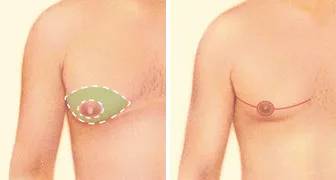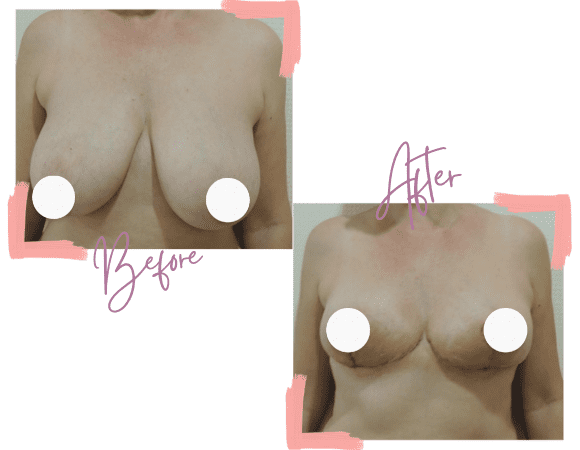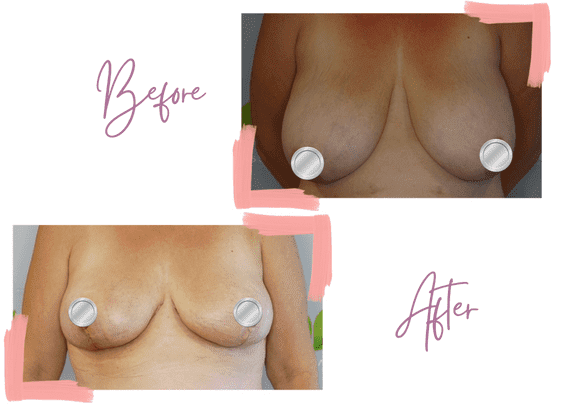Breast Reduction
Stop feeling conscious about your size
Your Breast Reduction Package Includes:
- Hospital Stay In A Single Private Room + Theatre + Pathology
- Australian Client Manager
- Surgery + Plastic Reconstructive Surgeon + Anaesthetist + Nursing Fees + Hospital Fees
- Bandages, Dressings + Prescribed Medications for 7 Days
- Pre + Post Operative Consultations with Our Surgeon
- Zoom Calls + Photo Checkups with Surgeon for 12 months
- Airport, Hotel and Hospital Transfers Included

- Breast Reduction
- Extended Breast Reduction
- Removal of Excess Skin
”The hospital and all the nurses and the surgeon himself, from start to finish, were more than I could have ever hope for
KerbyBreast Reduction
What is Breast Reduction Surgery?
Breast reduction surgery removes excess breast fat, glandular tissue and skin. Breast reduction aims to achieve a breast size in proportion with your body. The surgery may be performed to relieve the discomfort associated with overly large breasts. This operation is also called reduction mammoplasty.
A Breast Reduction is done when:
- You are uncomfortable with the large size of your breasts
- Your breasts are causing other issues – such as back problems
Am I Good Candidate
One or more of the following feelings or conditions may indicate that you are a good candidate for a Breast Reduction:
-
You are physically healthy and at a stable weight
-
You have realistic expectations
-
You are a non-smoker
-
You are bothered by the appearance of your large breasts
-
The size of your breasts are causing you to endure health problems such as include back, neck and shoulder pain, and skin irritation beneath the breast crease
-
The weight of excess breast tissue is restricting your ability to lead an active life
-
For men, you have excess skin and breast tissue
Procedure Details
The anchor shaped reduction is the most common way of performing this surgery. This goes around the areola and proceeds downward along the natural curve of the area beneath the breasts. Removal of the excess glands, fat and skin tissues take place next. The nipples and areolas are then moved into their new positions. Shaping and replacement of the skin takes place next, but usually only after excess fat tissue is removed from the armpits if necessary. It’s very rare to have a situation where the nipples are not reattached to the nerves and blood vessels, which would cause a loss of sensation if left unattached. Stitches are almost always used in every situation, be sure to ask your doctor if you’ll be able to do the surgery without stitches, this will reduce the scaring. Once the procedure is complete you’ll be wrapped in a surgical bra over the dressings. In most cases a small drain tube is used to help carry away blood and fluids for the first day. There can be some pain involved during the healing process especially when you move around. This is completely normal and will subside quickly as you heal, the more you pay attention to the diet and health advice the sooner the healing will be complete and the pain will subside earlier. Your surgeon will also prescribe a pain relief medication in most cases.
For standard cases, the surgery will go as follows:
ANESTHESIA The patient will be placed under general anesthesia in order to be completely asleep during the procedure. The breast reduction is typically considered an outpatient procedure; however, some patients may require an overnight stay.
INCISION The surgeon will make an incision using one of three techniques – an anchor incision (traditional incision that is made around areola, vertical down the breast, and then horizontally along the crease); a vertical incision (around the areola and vertical down the breast for less scarring); or a scarless incision (tiny incisions are made at the crease of the breast or at the armpit and liposuction is administered to remove fat).
BREAST REDUCTION Fat, tissue, and any excess skin are removed from the lower portion of the breast. Women with mostly fat tissue in the breasts could just require liposuction to reduce the breast size, which results in less scarring, less breast tissue trauma, and less chance of health complications occurring.
NIPPLE PLACEMENT The nipple will be repositioned higher up on the breast. The surgeon may or may not need to remove the nipple from the breast and then graft it in the correct place. Usually women with very large breasts require the nipple to be removed to be repositioned. The surgeon will inform the patient whether or not nipple sensation will be lost as a result.
CLOSE INCISIONS The surgeon will close the incisions using sutures. Various techniques may be used for sealing the incisions that your surgeon will discuss with you prior to the surgery.
Bandages will only take about two days before being removed but the surgical bra will have to remain for the 8-12 weeks. This will help maintain the shape of the breasts and protect them until the swelling and the bruising are reduced to normal. Stitches stay in for at least one week and sometimes can remain for two or more weeks. Almost all cases involve dry skin after surgery. Your first menstruation after the procedure may cause your breasts to swell. This has been known to cause shooting pains that will come and go for the next couple of months. It’s not as painful as it sounds but you will notice it. There will also be some loss of feeling in your nipples and skin caused by this swelling but usually fades no more than six weeks or so afterwards.
FEMALE BREAST REDUCTION

MALE BREAST REDUCTION

Your Recovery + After Care
At the time of your breast reduction surgery, your surgeon may place drains in your breasts in order to prevent a build-up of fluid in the breast area and to promote faster healing. Fluid that collects at the end of the drains will need to be emptied about once a day. Your surgeon will give you specific instructions regarding your drains. If the drain fills immediately after it is emptied or you need to empty it more than three times per day, you should contact your doctor.
After breast reduction surgery, your doctor will wrap your chest area in sterile dressings. The dressings will need to be changed one to two days after surgery and will eventually be replaced by a surgical bra, which will need to be worn for several weeks during your breast reduction recovery. You will be required to wear the surgical bra at all times, except when bathing.
You MUST Wear Compression Garments
Our surgeons require you to wear a compression garment once your drains have been removed. You MUST wear this compression garment for a minimum of 8-12 weeks – it is a good idea to purchase two or three garments so you can wash and wear. This will help in healing and controlling the swelling. Then move into a strong suportive bra for the next 6 months during the healing phase. Please do not go braless during the healing phase to ensure the best support.
We encourage you to walk around after you leave the hospital, so this is where you can take short trips to do some shopping, sightseeing or you might want to just go out to lunch or dinner. But this is not the time to do heavy sightseeing – you must stay in cool airconditioning so you do not increase your swelling (NO sunbaking or swiming) – enjoy great foot and leg massages and pampering. Please listen to your body and do not overdo it, it is very important to rest during your recovery from surgery. When you return home, please take it very easy and do light duties and do not pick up objects for about 2 months as this can put pressure on the stitches internally and externally. A few weeks after surgery, sutures used to close the deeper layers may spontaneously surface through the skin. Although these are expected to be absorbed within 4-6 months following surgery, these are still material foreign to the body and may be “pushed outwards” as healing continues. This can become visible or produce irritation and removal may be required. You may be able to remove these yourself or please see your local GP and they can remove them.
General risks of breast reduction surgery
In addition to possible breast reduction health complications that are common to many surgical procedures, there are specific potential breast reduction cosmetic risks. When deciding whether you are a breast reduction candidate, you should be aware of possible asymmetry, sensation problems, and future breast feeding issues associated with breast reduction surgery.
Bad Reaction to Anaesthesia
General anaesthesia, used during surgeries, is considered slightly more risky than local anaesthesia. It can cause an unpleasant or unexpected reaction; however, a qualified anaesthesiologist should be able to identify emerging problems before they become worse.
Blood Clots
Blood clotting is the body’s natural way of controlling the amount of blood that is lost after an injury, but depending on their location, they can be dangerous. If a blood clot forms inside a blood vessel, it may complicate your circulation. If a blood clot travels to your lungs, brain, or heart, the result can be deadly.
Decreasing Your Risk of Blood Clots
There are several things you can do to decrease the risk of blood clots, prior to surgery. First, be completely honest in your medical history and other information you provide to your doctor. Be sure to give your doctor a list of all medications you take prior to the surgery. This will help your doctor determine if you are at an increased risk of developing blood clots following surgery. If you take birth control pills, you may want to discontinue their use during the preparation and recovery from tummy tuck surgery – talk to your doctor about this possibility before doing so. After surgery, and during your recovery, most surgeons advise using compression stockings, pre- or post-operative leg massage, and short walks within a day or two of your surgery. Gentle movement is helpful and will speed your recovery, but too much exertion or vigorous activity can be detrimental.
Infection
Patients are at risk of developing an infection during and immediately following their surgery. A clean, sterile, operating room lessens the risk of contracting an infection during the surgery.
After surgery, the risk of infection increases if the surgical wound is not properly cared for. Your surgeon will have specific instructions for removing/changing bandages, exposing your wound to water, and keeping it clean. Note that it is normal to have some bleeding and leakage after surgery, but if the surgical wound is unclean, the risk of infection rises. Most infections following surgery are the result of the patient’s failure to properly care for their surgical wound during their recovery.
Fluid Accumulation
Most patients need drains after their procedure. The drains decrease the risk of seroma formation (i.e., fluid collection), which can cause infection. The drains create a point of exit for this fluid, reducing the risk of infection following surgery.
Slow Healing
Each patient will heal at his or her own pace. That being said, young patients in good physical condition typically heal faster than older or less physically fit patients. Tenderness, bruising, pain, and swelling usually subside after about four to six weeks. Patients who experience significant discomfort after six weeks have passed are considered to be healing slowly.
Smoking or exposure to cigarette smoke decreases the size of blood vessels, complicating circulation of oxygen to the skin cells.
Hematoma
Hematomas can be serious breast reduction problems. A collection of blood in a body cavity, a hematoma may cause pain, infections, scar tissue, or other issues. A sudden change in colour or contour of your breast is a warning that you may be developing a hematoma. Patients with this possible breast reduction complication should contact their physician immediately.
Client Testimonials
Types of Breast Reduction Surgery
Women who undergo breast reduction surgery want to alleviate the size of their breasts, achieve a more balanced breast shape and areola position, and live an active life comfortably.
Removal of excess skin/tissue and lifting
The anchor-shaped reduction is the most common way of performing this surgery. The incision goes around the areola and proceeds downward along the natural curve of the area beneath the breasts.
- Removal of the excess glands, fat, and skin tissues.
- Nipples and areolas are then moved into their new positions.
- Shaping and replacement of the skin take place next.
- Excess fat tissue is removed from the armpits if necessary .
Extended Breast Reduction
Breast area extending to under armpit and to back
An extended breast reduction is needed if there is further excess skin, the incision may extend to across the side of the body or under the arm pit. If there is further excess skin to be removed due to weight loss, then an extended breast reduction will be needed.
- Removal of the excess glands, fat, and skin tissues.
- Nipples and areolas are then moved into their new positions. .
- Shaping and replacement of the skin take place next.
- Excess fat tissue is removed from the armpits if necessary .
What To Expect?
Once you have submitted your surgery medical form and photos – our team will arrange a free assessment, and outline all the details you will need to know about the Surgery Price, Length of Stay in Bangkok, Hotel, Transfers, and much more.
Payment Plans
Don’t have all the funds ready for your surgery or dental trip? Medi Makeovers have partnered with Australia’s leading financial service to offer our clients finance for all aspects of their medical holiday – even spending money.
TLC Credit Benefits
TLC provides a payment plan solution to suit your lifestyle and has been designed to cover all medical, cosmetic and lifestyle needs as well as your associated costs.
- Payment plans up to $50,000 – including treatment / flights & accommodation
- No stress – the whole process is managed privately by our Consultants
- Flexible options – any additional repayments can be added back on to the payment plan at no extra charge
- Fast efficient approvals, simply apply online
TLC offers a simple and personal solution to customers, where they personalise the experience to suit customer expectations and desires to ensure a smooth transaction. Finance can be arranged to cover not only the cost of overseas procedures, but also all associated travel costs including spending money.

Five Star Recovery
Bangkok is the perfect destination for your surgery and/or dental trip as most attractions, shopping malls and transportation are air conditioned and away from the warm climate of Thailand. This is particularly important for your post-op recovery after surgery. Our hotels are located in the best parts of town, away from the nightlife – yet close to all major shopping centres (you can walk to them!), massages, hair salons and beauty salons so you can have the best possible recovery and indulge a little!




